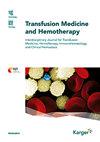两例泰国d阴性患者因输注红细胞出现亚洲型DEL而产生抗d异体免疫
IF 1.9
4区 医学
Q3 HEMATOLOGY
引用次数: 0
摘要
& lt; b> & lt; i>简介:& lt; / i> & lt; / b>DEL是已知的最弱的D变异之一,可以通过吸附-洗脱技术或分子研究来检测。目前,在泰国,我们没有在血清学rh阴性献血者中常规检测DEL变异的血清学或遗传学。& lt; b> & lt; i>案例表示:& lt; / i> & lt; / b>我们报告了2例输血Rh DEL后异体免疫,<i>RHD*DEL1</i>等位基因,在泰国人群中。第一个病例是73岁男性贫血,表现为心脏骤停和感染性休克。患者为B组,rh阴性,输注rh阴性红细胞(rbc)。抗体筛选鉴定发现患者出现抗- d和抗- mi< sup<在录取过程中。第二个病例是一名38岁的女性,她患有腹膜假性黏液瘤,在细胞减少手术和腹腔内高温化疗中接受4个单位的rhd阴性红细胞后出现抗d。两例患者均未接受抗d免疫球蛋白治疗,既往无抗d检测史。我们回顾性调查并发现了两个单位的<i>RHD*DEL1</i>在输血给这些病人的红细胞中& lt; b> & lt; i>讨论:& lt; / i> & lt; / b>先前关于RHD阴性受体输注<i>RHD*DEL1</i>(一种亚洲型DEL)发生抗d异体免疫的几例报道仅局限于东亚。我们首先发现2例患者在接受RHD*DEL1</i>泰国人口中的红细胞。这引起了人们对在d阴性泰国献血者中进行Rh DEL筛查以及是否从d阴性库存中删除DEL单位以改善患者安全的关注。本文章由计算机程序翻译,如有差异,请以英文原文为准。
Two Cases of Anti-D Alloimmunization in D-Negative Thai Patients as a Result of the Asian-Type DEL on Transfused Red Cells
Introduction: DEL is known to be one of the weakest D variants, which can be detected by the adsorption-elution technique or by molecular study. Currently, in Thailand, we do not routinely test for DEL variants serologically or genetically among serologic RhD-negative blood donors. Case Presentation: We reported 2 cases of alloimmunization after transfused with Rh DEL, RHD*DEL1 allele, in the Thai population. The first case was a 73-year-old male with anemia who presented with post-cardiac arrest and septic shock. The patient was group B, RhD-negative, and was transfused with RhD-negative red blood cells (RBCs). Antibody screening and identification found that the patient developed anti-D and anti-Mia during the admission course. The second case was a 38-year-old woman with pseudomyxoma peritonei who developed anti-D after receiving four units of RhD-negative RBCs during cytoreductive surgery with hyperthermic intraperitoneal chemotherapy. Both patients did not receive anti-D immunoglobulin and had no previous history of anti-D detection. We retrospectively investigated and found two units of RHD*DEL1 among the RBCs transfused to these patients. Discussion: Previous reports of several cases of anti-D alloimmunization in RhD-negative recipients transfused by RHD*DEL1, an Asian-type DEL, are limited only to East Asia. We first identified 2 patients with anti-D alloimmunization after receiving the RHD*DEL1 RBCs in the Thai population. This raises concern about Rh DEL screening among D-negative Thai blood donors and whether to remove DEL units from the D-negative inventory to improve patient safety.
求助全文
通过发布文献求助,成功后即可免费获取论文全文。
去求助
来源期刊
CiteScore
4.00
自引率
9.10%
发文量
47
审稿时长
6-12 weeks
期刊介绍:
This journal is devoted to all areas of transfusion medicine. These include the quality and security of blood products, therapy with blood components and plasma derivatives, transfusion-related questions in transplantation, stem cell manipulation, therapeutic and diagnostic problems of homeostasis, immuno-hematological investigations, and legal aspects of the production of blood products as well as hemotherapy. Both comprehensive reviews and primary publications that detail the newest work in transfusion medicine and hemotherapy promote the international exchange of knowledge within these disciplines. Consistent with this goal, continuing clinical education is also specifically addressed.

 求助内容:
求助内容: 应助结果提醒方式:
应助结果提醒方式:


